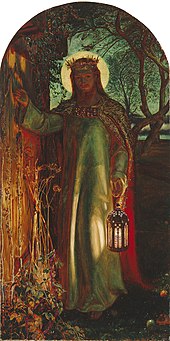Synergism
| Part of a series on |
| Salvation in Christianity |
|---|
 |
| General concepts |
| Particular concepts |
| Punishment |
| Reward |
In Christian theology, synergism is the belief that salvation involves some form of cooperation between God and man. This perspective is supported by the Catholic Church, and Eastern Orthodoxy. Synergism is central to Arminian theology which is present in many Protestant denominations such as Anabaptist Churches, Anglican Churches and Methodist Churches. Semi-Pelagianism also incorporates elements of synergism.
Semi-Pelagianism view
[edit]Semi-Pelagianism involves a form of synergism, as it teaches that the initial act of faith originates from human will, while the subsequent growth and completion of faith are attributed to God's grace.[1]
Catholic theology
[edit]Synergism, the teaching that there is "a kind of interplay between human freedom and divine grace", is an important part of the salvation theology of the Catholic Church.[2][3]
The Catholic Church rejects the notion of total depravity: they hold that, even after the Fall, human nature, though wounded in the natural powers proper to it, has not been totally corrupted.[4] In addition, they reject double predestination, the idea that would "make everything the work of an all-powerful divine grace which arbitrarily selected some to be saved and some to be damned, so that we human beings had no freedom of choice about our eternal fate".[5]
The Catechism of the Catholic Church teaches that the ability of the human will to respond to divine grace is itself conferred by grace. "By the working of grace the Holy Spirit educates us in spiritual freedom in order to make us free collaborators in his work in the Church and in the world".[6] "The preparation of man for the reception of grace is already a work of grace."[7] "When Catholics say that persons 'cooperate' in preparing for and accepting justification by consenting to God's justifying action, they see such personal consent as itself an effect of grace, not as an action arising from innate human abilities."[8]
Eastern Orthodox theology
[edit]The Eastern Orthodox view of synergism holds that "human beings always have the freedom to choose, in their personal (gnomic) wills, whether to walk with God or turn from Him", but "what God does is incomparably more important than what we humans do".[9][10][11]
"To describe the relation between the grace of God and human freedom, Orthodoxy uses the term cooperation or synergy (synergeia); in Paul's words, 'We are fellow-workers (synergoi) with God' (1 Corinthians iii, 9). If we are to achieve full fellowship with God, we cannot do so without God's help, yet we must also play our own part: we humans as well as God must make our contribution to the common work, although what God does is of immeasurably greater importance than what we do."[12] "For the regenerated to do spiritual good — for the works of the believer being contributory to salvation and wrought by supernatural grace are properly called spiritual — it is necessary that he be guided and prevented [preceded] by grace."[13]
Anabaptist theology
[edit]Anabaptists hold to synergism,[14] teaching that "both God and man play real and necessary parts in the reconciling relationship which binds them."[15] Anabaptists have a high view of the moral capacities of humans when "enlivened by the active agency of the Holy Spirit."[15]
Lutheran theology
[edit]Monergism is central to the Reformed understanding of providence.[16] In contrast, Lutherans limit monergism strictly to soteriological aspects.[17] While Martin Luther himself believed that soteriological monergism applied to both election and reprobation, Lutheran confessions affirm monergism solely in relation to election, explicitly rejecting its application to reprobation.[18]
Anglican theology
[edit]In Anglican Churches there are both synergistic,[19] and monergistic views of salvation.[20]
Arminian theology
[edit]
Christians who hold to Arminian theology, such as Methodists, believe that salvation is synergistic, being achieved through "divine/human cooperation".[14][3]
Arminius distinguished between "prevenient" or "preceding" grace that involves a monergistic work of God, and a "subsequent" or "following" grace that involves a synergistic work.[21] Similarly, Wesleyan-Arminian theology teaches that both justification and sanctification are synergistic.[22]
Arminians believe that all humans are totally corrupted by sin but God grants all sinners prevenient grace (prevenient meaning "coming before"). With this prevenient grace, a person is able to freely choose to place faith in Christ or reject his salvation. If the person accepts it, then God justifies them and continues to give further grace to spiritually heal and sanctify them.[23] This view differs from semipelagianism, which maintains that a human being can begin to have faith without the need for grace.[24]
See also
[edit]- Dyoenergism
- Dyothelitism
- Libertarianism (metaphysics)
- Monergism
- Monoenergism
- Prevenient grace
- Theosis
Notes and references
[edit]Citations
[edit]- ^ The Oxford Dictionary of the Christian Church (Oxford University Press 2005 ISBN 978-0-19-280290-3), article "semipelagianism".
- ^ Catechism of the Catholic Church, Reader's Guide to Themes (Burns & Oates 1999 ISBN 0-86012-366-9), p. 766
- ^ a b Olson 2002, p. 281. "Two examples of Christian synergism are the Catholic reformer Erasmus, who was roughly contemporary with Luther, and the seventeenth-century Dutch theologian Arminius. John Wesley, founder of the Methodist tradition, was also a synergist with regard to salvation."
- ^ Catechism of the Catholic Church, 405
- ^ Glenn F. Chesnut, Changed by Grace (iUniverse 2006 ISBN 978-0-59585044-0), p. 145
- ^ Catechism of the Catholic Church, 1742
- ^ Catechism of the Catholic Church, 2001
- ^ Joint Declaration on the Doctrine of Justification by the Lutheran World Federation and the Catholic Church
- ^ Payton Jr., James R. (14 January 2010). Light from the Christian East: An Introduction to the Orthodox Tradition. InterVarsity Press. p. 151.
- ^ Stamoolis, James J. (5 October 2010). Three Views on Eastern Orthodoxy and Evangelicalism. Zondervan. p. 138. ISBN 9780310864363.
A further concession is made, one that could easily be made by an Arminian Protestant who shared the Orthodox understanding of synergism (i.e., regeneration as the fruit of free will's cooperation with grace): "The Orthodox emphasis on the importance of the human response toward the grace of God, which at the same time clearly rejects salvation by works, is a healthy synergistic antidote to any antinomian tendencies that might result from (distorted) jurdicial understandings of salvation.
- ^ "Theosis – Malankara Orthodox Syrian Church". Retrieved 2023-08-14.
- ^ Timothy Ware, The Orthodox Church (Penguin UK 1993 ISBN 978-0-14192500-4
- ^ Pan-Orthodox Synod of Jerusalem (1672), Decree 14
- ^ a b Bloesch 2005, p. 362. "Yet the polarity seems to fall between Reformation monergism (esp. Calvinist) and Anabaptist and Wesleyan synergism."
- ^ a b Hill 2020, p. 129.
- ^ Robinson 2022, p. 379.
- ^ Straton 2020, p. 159.
- ^ Horton 2011, Ch. The dogma is the Drama. "In fact, Luther affirmed both election and reprobation in the strongest terms. The Lutheran confessions, however, affirm God's unconditional election of those on Whom he will mercy but deny his reprobation of the rest as an actual decreee. The confessional Lutheran and Reformed theologies differ with respect to the decree of reprobation, the extent of atonement, and the resistibility of God´s grace, the are united in their defense of soteriological monergism".
- ^ Olson 1999, p. 535. "Many Anglicans follow Richard Hooker's brand of synergism [...]".
- ^ Salter 2019. "The code and creed of Anglicanism is richly Trinitarian (divine self-disclosure), soteriologically monergistic (grace alone), and warmly pastoral (godly care) in its approach to the people it serves within and beyond the bounds of its membership."
- ^ Stanglin & McCall 2012, p. 152.
- ^ Fahlbusch 2008, p. 272. ""Methodist "synergism" is grounded in the conviction that in the justification begun in the new birth (the beginning of the divine work), there will have to be "appropriate fruits."
- ^ Olson 2009, p. 18. "When Arminian synergism is referred to, I am referring to evangelical synergism, which affirms the prevenience of grace to every human exercise of a good will toward God, including simple nonresistance to the saving work of Christ."
- ^ Pohle 1912.
Sources
[edit]- Bloesch, Donald G. (2005). The Holy Spirit: Works Gifts. Downers Grove, IL: InterVarsity Press. ISBN 978-0-8308-2755-8.
- Fahlbusch, Erwin (2008). The Encyclopedia of Christianity. Grand Rapids, MI: Wm. B. Eerdmans Publishing. ISBN 9780802824172.
- Hill, Samuel S. (2020). Southern Churches in Crisis Revisited. Tuscaloosa: University of Alabama Press. ISBN 978-0-8173-6008-5.
- Horton, Michael (2011). he Christian Faith: A Systematic Theology for Pilgrims on the Way. Grand Rapids, MI: Zondervan Academic.
- Olson, Roger E. (1999). The Story of Christian Theology: Twenty Centuries of Tradition & Reform. Downers Grove, IL: InterVarsity Press. ISBN 9780830815050.
- Olson, Roger E. (2002). The Mosaic of Christian Beliefs: Twenty Centuries of Unity & Diversity. Downers Grove, IL: InterVarsity Press.
- Olson, Roger E. (2009). Arminian Theology: Myths and Realities. Downers Grove, IL: InterVarsity Press.
- Pohle, Joseph (1912). . In Herbermann, Charles (ed.). Catholic Encyclopedia. Vol. 13. New York: Robert Appleton Company.
- Robinson, Geoffrey D. (2022). Saved by Grace through Faith or Saved by Decree?. Eugene, OR: Wipf and Stock Publishers.
- Salter, Roger (1 February 2018). "THE MARTYRS' STAKE: The Ensign of Reformational Anglicanism". VirtueOnline. Retrieved 23 June 2019.
- Stanglin, Keith D.; McCall, Thomas H. (2012). Jacob Arminius: Theologian of Grace. New York: OUP USA.
- Stratonn, Timothy A. (2020). Human Freedom, Divine Knowledge, and Mere Molinism: A Biblical, Historical, Theological, and Philosophical Analysis. Eugene: Wipf and Stock Publishers.
